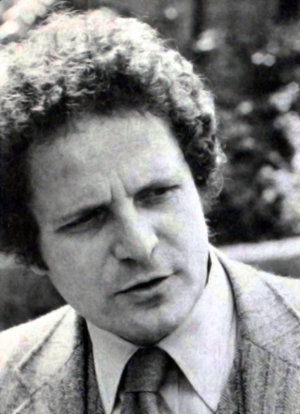Jean Pierre Cot
( academic, politician) | ||||||||||||||||||||||||||||||||||||
|---|---|---|---|---|---|---|---|---|---|---|---|---|---|---|---|---|---|---|---|---|---|---|---|---|---|---|---|---|---|---|---|---|---|---|---|---|
 | ||||||||||||||||||||||||||||||||||||
| Born | 23 October 1937 Geneva, Switzerland | |||||||||||||||||||||||||||||||||||
| Nationality | • Swiss? • French | |||||||||||||||||||||||||||||||||||
| Alma mater | Sorbonne University | |||||||||||||||||||||||||||||||||||
| Partner | Raymonde Dury | |||||||||||||||||||||||||||||||||||
| Parents | Pierre Cot | |||||||||||||||||||||||||||||||||||
| Party | Socialist Party (France) | |||||||||||||||||||||||||||||||||||
Swiss law professor & politician. Attended the 1977 Bilderberg aged 39, possibly connected to "attitudes towards the Third World's demands for restructuring the world order"
| ||||||||||||||||||||||||||||||||||||
Jean-Pierre Cot is a French jurist and politician. He attended the 1977 Bilderberg meeting, possibly on connection with the theme attitudes towards the Third World's demands for restructuring the world order, as he later became French Minister for Development.[1][2][3] He also wrote the preface to a translated collection of texts by Zbigniew Brzezinski.
Education
He is son of the politician Pierre Cot. He grew up in the United States until age 11. After studying law at Sorbonne University in Paris from 1955 to 1965, he received a Ph.D. in 1966.[4]
Career
He then was professor of public law and international law at the University of Amiens, then the University of Paris I, before being elected as a deputy for Savoie in 1973. He was later re-elected, before joining the Socialist government of Pierre Mauroy in 1981 as deputy minister in charge of Co-operation and Development.
He was a Member of European Parliament (MEP) in 1978–1979 and 1984–1999, and chaired the socialist group of the European Parliament between 1989 and 1994, before becoming its vice-president in 1997.[5]
He became a member of the International Tribunal for the Law of the Sea in 2002.
Trilateral Commission
In 1977, the same year he attended Bilderberg, he wrote the preface to a translated collection of texts by Zbigniew Brzezinski. Cot's political views are obviously flavored by this:
America can and must assume its responsibilities. It is not a question of dictating one's will to the rest of the world. Such authoritarianism is no longer conceivable today. American leadership must be exercised with respect for global pluralism.[...]
-- In this perspective, three priorities are imposed on American foreign policy. The first is the trilateral concern. We find here a constant theme. The United States must rely on its friends, these industrialized states that share the same values and find themselves in the same alliance. By treating Europe and Japan with condescension, Kissinger encouraged a dangerous drift in Atlantic and peaceful relations. The choice of being privileged partners of Moscow and Beijing has triggered - by backlash - seeds of neutralism among the allies, thus diluting the alliance. We must put an end to this situation by clearly highlighting the special ties between the United States, Western Europe and Japan. Brzezinski proposes to institutionalize the Trilateral Commission at the level of governments, encouraging Europe to speak with one voice, on an equal footing with America and Japan. We can see the consequences of this analysis: resolute support for European integration, enlargement of the OECD and strengthening of its role.[...]
The second priority concerns North-South relations. The third world threatens to explode. The Kissinger administration realized this late and multiplied the blunders. America, the watchdog of dictatorial and corrupt regimes, is losing all ability to influence the course of events in the third world. Political conservatism, coupled with economic selfishness, can only lead to failure.[...]
Under these conditions, withdrawal would be madness. The restriction or interruption of international trade would jeopardize the progress of our economy. This does not mean that we must submit to the law of the international market, accept without saying a word the international division of labor as it presents itself today, with its inescapable imperialist tendencies. The France of the united left will have to loosen these constraints. Its economic weight, its capacity for innovation in basic and applied research, its developed agriculture, its place on the European market give it the elements of a negotiation with its partners. While the present government is going in front of the desires of international capitalism, another industrial policy can increase our autonomy of decision and our weight in international affairs. It is still necessary to boldly devise an offensive strategy that will be the opposite of the temptation to retreat.[...][6]
Event Participated in
| Event | Start | End | Location(s) | Description |
|---|---|---|---|---|
| Bilderberg/1977 | 22 April 1977 | 24 April 1977 | Imperial Hotel Torquay UK | The 25th Bilderberg, held in Torquay, England. |
References
- ↑ https://www.amazon.de/-/en/Jean-Pierre-Cot/dp/2020068273
- ↑ https://www.monde-diplomatique.fr/1984/02/ZIEGLER/37862
- ↑ https://www.jstor.org/stable/42674453
- ↑ https://www.munzinger.de/search/go/document.jsp?id=00000019408
- ↑ https://www.europarl.europa.eu/meps/fr/1027/JEAN-PIERRE_COT/history/4
- ↑ https://www.monde-diplomatique.fr/1977/09/COT/34418